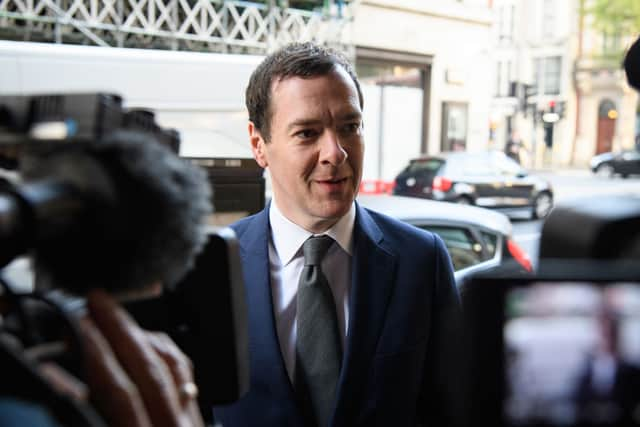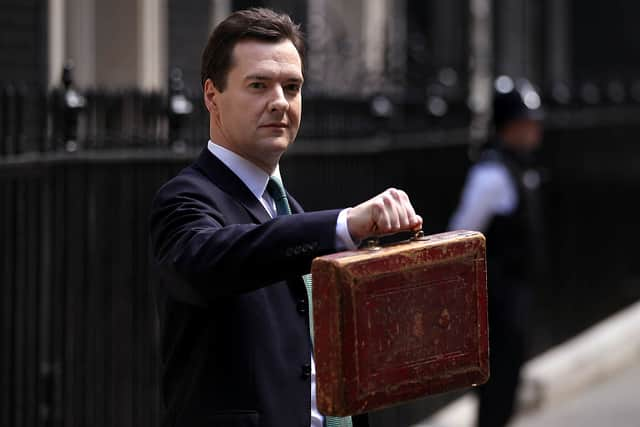Who is George Osborne? Politician’s life and career explained, from UK Chancellor to British Museum chairman
and live on Freeview channel 276
Former UK Chancellor George Osborne is making headlines at the moment following a scandal surrounding the theft of artefacts from the British Museum.
It emerged last week that “close to 2,000” items - including gems and and gold - had been stolen from the institution, alongside reports that a member of staff suspected of involvement had been sacked. Hartwig Fischer, the museum’s director, resigned on Friday (25 August) after admitting he did not respond appropriately to warnings of theft in 2021, when Ittai Gradel, an art dealer, alleged he had seen artefacts belonging to the museum for sale on eBay.
Advertisement
Hide AdAdvertisement
Hide AdAs the chairman of the British Museum, Osborne has had to address the scandal - confirming over the weekend that the institution believes it has been “the victim of thefts over a long period of time”. He apologised for the “mess” the scandal had caused - and accepted the “damage” to the museum’s reputation.
Osborne also admitted that “more could have been done” to prevent the thefts. Asked why prior warnings were not taken seriously, the ex-MP said he did not believe there was a “cover-up” at the top of the museum - but did confirm that an independent review will look at “how the museum missed some of the signals that could have been picked up”.
Following a prominent career in politics, Osborne is no stranger to the spotlight. During his time as a Conservative Party adviser, an MP, and then as the Chancellor of the Exchequer, he has also been involved in a scandal or two - so dealing with these types of situations is not exactly new territory.
With that being said then, who exactly is George Osborne - and what do you need to know about him? Here, NationalWorld has taken a look at his life, career, and key moments over the past several years.


Who is George Osborne?
Advertisement
Hide AdAdvertisement
Hide AdOsborne, 52, is a former Tory MP who served as the UK’s Chancellor of the Exchequer under former Prime Minister David Cameron.
He was born in Paddington, London, the eldest of four boys, and was privately educated at Norland Place School, Colet Court and St Paul’s School. He later studied a degree in Modern History at the University of Oxford, where he achieved a 2:1.
After graduating in 1993, Osborne originally wanted to pursue a career in journalism - but later switched to politics and joined the Conservative Research Department in 1994. Over the next few years, he had a couple stints as a government adviser - before joining then-Prime Minister John Major’s campaign team in 1997.
The Tories suffered a heavy election defeat that year, but Osborne continued in politics and worked for Major’s successor William Hague between 1997 and 2001. He took on the role of a speechwriter and secretary - frequently helping Hague prepare for the weekly session of PMQs by playing the role of then-Labour PM Tony Blair.
Advertisement
Hide AdAdvertisement
Hide AdIn the 2001 general election, Osborne made the full leap into politics when he was elected MP for Tatton, Cheshire. He won with a majority of 8,611 over the candidate for the Labour Party, and became (at the time) the youngest Conservative MP in the House of Commons. He was re-elected in 2005 and 2010, increasing his majority both times.


In 2010, Osborne was appointed the UK’s Chancellor of the Exchequer under Prime Minister David Cameron, after serving as Shadow Chancellor since 2005. During this time, he was widely viewed as a potential future leader of the Conservatives, were Cameron to stand down at any time.
When Theresa May became Prime Minister in July 2016, Osborne was sacked as Chancellor and became a backbencher. During this time, he engaged in a series of lucrative speaking appearances - and became the highest earning MP of 2016.
In February 2017, despite still being an MP, Osborne started a new role as a part-time advisor to BlackRock, the world’s largest fund manager, for a salary of £650,000 for a one-day a week. Soon after securing that gig, he announced he would be standing down as an MP - ending his political career at the age of just 45.
Advertisement
Hide AdAdvertisement
Hide AdFollowing his departure from politics, Osborne returned to journalism - becoming the editor of the Evening Standard in May 2017. He stayed there for nearly four years, leaving the newspaper in March 2021, and subsequently taking up a job as an investment banker at Robey Warshaw.
In June 2021, it was announced that the trustees of the British Museum had unanimously elected Osborne as the institution’s chairman.
What was George Osborne like as Chancellor?
During his time as UK Chancellor, Osborne was most known for his era of so-called ‘austerity’. He began his role as head of the Treasury in the aftermath of the 2008 global financial crash, which led to him vowing to be “tougher than Thatcher” on the UK’s budget deficit.
This resulted in a series of cuts, including a cap on the overall amount of benefits a family can receive from the state, a reduction to housing benefits, and a two-year pay freeze for public sector workers. Spending on the police, the courts, welfare, and local government was also reduced.
Advertisement
Hide AdAdvertisement
Hide AdOne of the criticisms he received when he announced his 2016 Budget was that although he declared spending cuts to those receiving disability benefits “necessary” in order to weather the “storm” of global economic uncertainty in future, he found the money to increase the highest 40p tax band by £2,500 - offering savings to anyone on a salary greater than £42,500.
Some of Osborne’s other policies included a “Google Tax”, which was designed to tackle tax avoidance by the rich by discouraging large companies from diverting profits out of the UK, and a ‘Northern Powerhouse’ scheme, which aimed to boost economic growth in the North by devolving power, developing transport links, and securing foreign investment across the cities in Northern England.
What controversies has he been involved with?
One of the earliest public controversies Osborne was involved with was something of a scandal relating his expenses - in particular for claims he made for mortgage interest payments on his properties in Cheshire.
He was also made to pay back over £1,000 spent on chauffeur fares following a complaint from a Labour Party activist, and it later emerged he had claimed £47 for two copies of a DVD of his own speech on “value for taxpayers’ money”. A subsequent report by the Parliamentary Commissioner for Standards found that although Osborne had breached the rules, the offence had been “unintended”.
Advertisement
Hide AdAdvertisement
Hide AdReports also emerged of Osborne saying a fair few harsh words about some of his political rivals. Over the years, he referred to Gordon Brown as “brutal”, “unpleasant”, and “past his sell-by-date”, and declared him likely to make an “effing awful” Prime Minister whilst Brown was still Chancellor.
Osborne also faced criticism from some for appearing to suggest that Brown was autistic - when, during an interview, after speaking about his own ability to recall odd facts, the host suggested to Osborne he may be “faintly autistic”. Osborne replied: “We’re not getting onto Gordon Brown yet.”


Osborne was also reported to have made some harsh criticisms of Theresa May, who sacked him as Chancellor. In a profile of Osborne published by Esquire in September 2017, it was alleged that he had commented to several staff at the Evening Standard that he would not be satisfied until May was “chopped up in bags in my freezer”.
While Osborne never directly commented on the incident, an editorial in the Standard published nearly a week later was interpreted as Osborne’s apology to May. It said “harsh” words had been said in connection with the Prime Minister’s Brexit policy, but “intemperate language, even when said in jest” was inappropriate.
Advertisement
Hide AdAdvertisement
Hide AdOsborne’s most recent controversy came ahead of his wedding to now-wife Thea Rodgers, when a mystery online email was sent to all of his guests - detailing a series of allegations against him. Friends of the couple said the email - which was subsequently posted online - was part of a “long-term campaign” of abuse and “made-up rumours”, and Osborne confirmed he had called in police to investigate the alleged online harassment.
Comment Guidelines
National World encourages reader discussion on our stories. User feedback, insights and back-and-forth exchanges add a rich layer of context to reporting. Please review our Community Guidelines before commenting.
